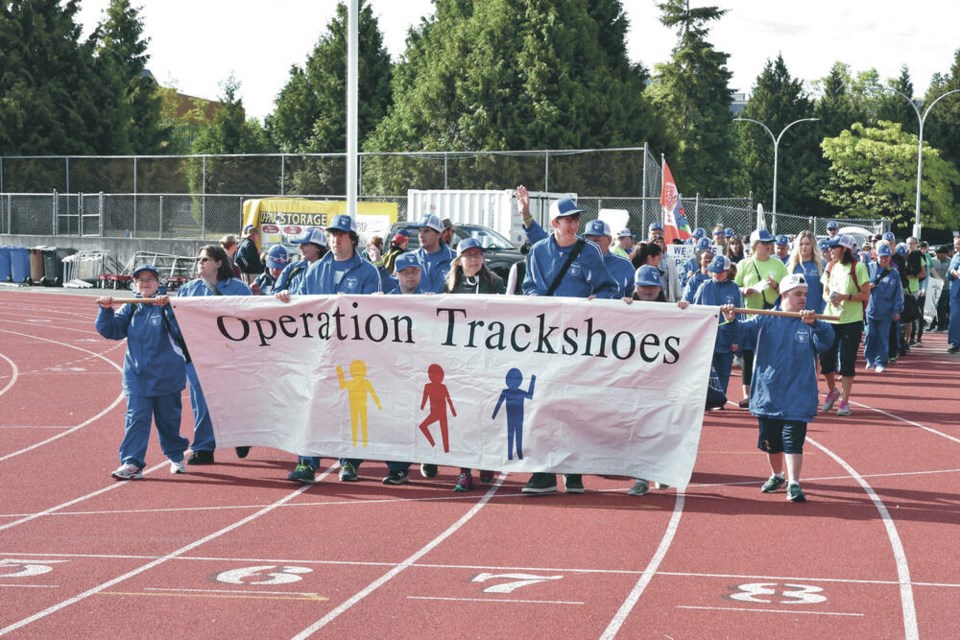What started as an afternoon sports gathering for people with developmental disabilities grew into a festival with a 50-year legacy, and Judith Armstrong has been there every step of the way.
Now, after five decades of bringing joy to thousands and thousands of participants, Operation Trackshoes is on its final lap.
The long-standing community celebration has been a fixture at the University of Victoria’s Centennial Stadium since 1971.
This year’s event from next Friday to Sunday will be the last one.
It all started as an occasion for 98 competitors in 1971 and growth was immediate, with registration increasing to around 300 in 1972. From there, Operation Trackshoes was off and running.
Former lieutenant-governor George Pearkes was on hand to open the inaugural event.
Armstrong, who started helping with Operation Trackshoes as an 18-year-old, has a particular image of what the event means to her.
It came when three girls — two participants and a counsellor — were simply strolling together across the stadium infield, she said. “They’re just walking, zig-zagging. When you see that, it’s just a group of three teenagers out there having fun together. We’ve always said that Operation Trackshoes is a gathering place, a meeting place for people with and without disabilities.
“It’s really about inclusion for everyone.”
One athlete who is looking forward to the event is Heather Light, who has taken part for 13 years.
Running is one of her things, said the 41-year-old, and she plans to be in the 50-metre, 100-metre and 400-metre races.
“I also like doing the soccer kick and basketball throw,” Light said. “And being with all of my friends.”
She said she looks forward to Operation Trackshoes every year, and is sorry to hear that it is coming to an end.
“So I’m kind of happy about going and sad about going, as well.”
But Light will still have the Special Olympics to be involved in, where she takes part in both track-and-field and swimming.
Saying goodbye after all this time is tough, Armstrong said, who is retired from Island Health’s brain-injury program — especially for the core group of volunteers that has been part of things for so long.
“We really want to celebrate that we got to do this for 50 years.”
There will be a memorabilia tent at this year’s event to mark the occasion, and many past volunteers are coming back to be part of the send off, she said.
Calling it a day was not what anybody wanted, Armstrong said.
“It hasn’t been easy to say this is the final year, but there’s lots of different reasons.”
For one thing, there haven’t been new people to step into the leadership roles that require such a big commitment. Along with that, the technical systems used to run the event are old and in need changes that would be difficult to get in place.
And there are more venues now for people who want to take part in the sorts of activities that Operation Trackshoes offers.
“Back in ’71, there certainly weren’t the opportunities that there are today for people that live with a developmental disability,” Armstrong said. “If you’re thinking in terms of sustainability, we have to have a competitor population that’s sustainable — as well as the volunteer population.”
Armstrong said the name Operation Trackshoes emerged from brainstorming sessions and a desire to call the fledgling event something fun and light-hearted. Track is a big part of it, but swimming is also in the mix.
Numbers peaked in 1988 with 900 participants.
Taking into account COVID-19-related cancellations, 2023 emerges as the 50th year, Armstrong said.
The beginning for Operation Trackshoes came after Armstrong and several others saw a film on the Special Olympics. Coupled with a few of them having visited Easter Seal Camp Shawnigan for people with disabilities, the notion of combining sports and a summer-camp experience was born.
The number of participants has decreased somewhat in recent years, but the event has remained an attraction for people all over the province.
Anyone from six to 80 can register, with most spending the weekend in UVic dorms. Counsellors spend the weekend in the dorms, as well.
Dances and other social events like a coffee house and karaoke are held as part of the experience, and there is drop-in basketball and softball — and opportunities for counsellors and athletes to go head-to-head in things like sack races and leap frog.
“We have a lot of fun events that everybody can go in together,” Armstrong said.
Fun events are one of three activity levels to choose from, along with recreational and competitive options, in order to make sure that as wide a range of people as possible can be involved.
Some funding comes from the province, competitors pay registration fees, and various foundations, service clubs and business have given their support to keep the festival going, Armstrong said.
“We’ve been very grateful to the Victoria community.”
Anyone who would like to get involved is invited to send a note to [email protected].
>>> To comment on this article, write a letter to the editor: [email protected]



